Humane Management
Back to Contents of Issue: May 2003
|
|
|
|
by John Dodd |
|
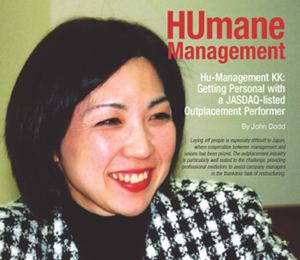 Laying off people is especially difficult in Japan, where cooperation between management and unions has been prized. The outplacement industry is particularly well suited to the challenge, providing professional mediators to assist company managers in the thankless task of restructuring. After a sustained downturn in the Japanese economy, the outplacement business is one of the few industries now gaining ground. Near the head of the pack is a small, virtually unknown but public (JASDAQ 4778, listed in August 2000) HR company called Hu-Management. Hu-Management Japan Co., Ltd. set out early on to establish a system of morale support for those losing their jobs -- a system that has set the standard in an industry that remains largely unregulated. The stock market has rewarded the company accordingly, and in the last three months alone, company shares have risen from JPY159,000 to over JPY330,000 per share. To find out why this company has been doing so well and how the industry functions, we interviewed managing director Miyuki Zeniya, who was the fifth employee to join Hu-Management back in 1995. JI: How big is Hu-Management now? Hu: When I joined in 1995, there were only five of us. The following year we doubled in size. And today, the company has grown to over 500 staff in 50 offices around Japan. JI: What kind of market share does your company enjoy at present? Hu: There are no truly accurate statistics, but we heard that JCMP, Japan Career Management Professionals, said that the market size for outplacement is JPY32 billion, up from JPY26 billion only two years ago. Our sales last year were around JPY1.5 billion, and this year we expect further growth. Indeed, by December, our sales were already at JPY3 billion for the first nine months of the year. JI: How would you define outplacement? Hu: The concept of outplacement in Japan is a bit different from the way it's defined in the US or UK. Here in Japan, the typical service package is a combination of career counseling and job search advice. This is different from the US approach. American companies use outplacement vendors to remove low performers, and thus the goal of the outplacement service is to make sure that people are counseled about their failings as a contributing employee -- and about how they might address those problems. The cause of most outplacement requests in Japan isn't the lack of performance by the individual, but rather the lack of performance by the company. Thus companies feel a lot of responsibility towards employees being laid off and they want to make sure those employees can find another job as soon as possible. So our role is not only to counsel the person about how to react to job loss, but also to help them find a new one quickly.
JI: So you have to become a recruiting company? Hu: In a manner of speaking, yes. The difference is that we provide the job-finding service free of charge both to the former employee and to the new company that may want to hire them.
"The cause of most outplacement Hu: Yes, this is correct. For many people, it is the first time since they graduated that they have had to look for a job. Indeed, for most of them it's even the first time that they have had to write a resume! So they're really ill-equipped. Otherwise quite competent people are thrown into a severe state of confusion when they discover they are going to be jobless. It's our job to help them understand what is going on, what kind of person they are, and what type of job would suit them in the future. Then we need to actually help them look for and interview for the new job. JI: Do you find that there is a major attitude readjustment necessary by some of these newly unemployed people? Hu: Yes. A major part of our job is to help each person realize that the world, and the company, no longer owes them a living, and that they have to try to re-mold themselves to match the needs of the outside world's labor market. It can be quite a shock for some of these people, especially those in their 50s. We've had the occasional case where older middle managers come to our office each day at 9 a.m. and leave for home again at 5:30 p.m. And the family thinks they're still attending their old employer's office. JI: You mean, they haven't told their wives that they're unemployed? Hu: That's right. They just don't know how to deal with this huge shock in their lives, so they go about with a sense of denial. It's our job to help them come to grips with this. We try to emphasize to such people that it's not a point to be ashamed of. We tell them that they were made redundant not through something that was their fault, but because of their former employer's inability to survive the downturn intact. After a while, they realize that they are still functioning human beings, they go home and tell their families, and then they feel a lot better afterwards and come back ready to challenge the future.
JI: That must require some fairly intensive counseling. But as we understand it, counseling as a profession is not well developed in Japan. You're almost acting as pioneers in the psychology profession. How do you get trained counselors to provide these very critical services? Hu: There is a counseling license (Industrial Counseling) issued by the Ministry of Labor. We have our counselors study for this license -- which teaches the basics of psychology, counseling interaction (how to listen, how to respond), etc. A natural instinct of a new counselor is to "lead" the candidate to help fix their problems -- but of course, unless the candidates themselves understand what the problem is, they won't be able to participate in a plan of remedial action.
JI: Getting back to people who have just lost their jobs, how about this as a hypothetical scenario? I'm 50 years old and have been working for the same company continuously since I was 22. I've just been told that I'm being fired and have been introduced to Hu-Management as an outplacement company. What is going to happen to me? Hu: On the first day, most people feel either depressed or angry, so the initial session is very important. We set up a one-on-one session for about 90 minutes and try to get the candidate "engaged" on an emotional level of trust with the counselor. Without this emotional bond, the counselor has to work a lot harder to get major issues and points through to the candidate. This first session is almost totally dedicated to the counselor listening to the candidate discuss their background. We want these people to get their feelings out in the open and be ready to come to grips with them. JI: What is a typical course for a candidate? Hu: Usually they come to the training/counseling center once a week. They're given homework such as writing essays about what they want to do in the future, and also why they might have lost their jobs. This course typically runs for five to six weeks -- although sometimes the period is shorter.
Occasionally we have candidates who need a lot more counseling and need to come in for up to 24 months. However, in our experience, once the candidate establishes a rapport of trust with the counselor, things usually move along quite quickly.
JI: What do you spend the most time on during the counseling? Hu: In a situation that is possibly unique to Japan, companies normally decide the careers of their staff and "good" employees just follow along, doing what they're told to do. So these people really have no clue about what their value is going to be on the open market. Trying to help them assess their real market worth -- which is sometimes a lot lower than the candidate's self-assessed worth -- can be a real challenge. The other thing is that even if the candidate doesn't have a strong ego, the fact remains that most people are generalists, having done two or three years each in HR, R&D, domestic manufacturing, distribution, et cetera. Thus, when they reach their 50s, what they know is not specialized enough to give them leverage with a prospective employer. JI: How do you help these people, then? Hu: It's important to decide what the candidate could do to get a suitable job in the open world. Usually we focus on what type of job they did last in their corporate career, because this is freshest in their minds and more likely to stimulate a would-be hirer.
Hu: Yes, we outsource that work to a specialist company. We are committed to using professional methodology in assessing and assisting our candidates. JI: After deciding what the person should choose as their next job target, what comes next? Hu: We start practical training. For some of these people, we even need to help them relearn how to politely greet a candidate in the Japanese way, and how to elicit responses from a customer without appearing to be desperate or over-demanding. This is especially important for those candidates who occupied a senior job at their previous company. In a large company, these people sometimes lose touch with the real world.
JI: Where do you normally find jobs for the candidates after they've received their training? Hu: Usually they enter small- to medium-sized (SME) companies. As you might imagine, it can be difficult migrating from a large corporation to a small operation where the CEO may decide and control everything. We really focus on equipping people for the right set of skills to deal with this migration.
"We also help managers understand JI: How do you find jobs for candidates? Hu: We spend a lot of time on this phase. First, we scan the news and magazine reports for SMEs that appear to be growing robustly and probably need more staff. We also have a database which we're populating with the contact details for smaller companies who might need help.
Hu: No, we prefer to let our professionals focus on their chosen field. So we have counselors who look after preparing the candidate, and job search consultants whose job is to look for suitable positions. If the job search consultant finds a suitable position, they will contact the counselor to connect the candidate with the potential hiring party. JI: Let's say I've got a 50-year-old manager from a famous Japanese sogo shosha (trading company). How do you convince the CEO of a small but growing company to take someone like this on? Hu: It's true that such SME CEOs are probably getting lots of unsolicited resumes these days. However, the point we try to make to a CEO is that we have professional counselors who can issue an assessment for the CEO -- thus reassuring them that we can share some strong and perceptive insights into the person's personality and makeup, and taking some of the risk out for the potential employer. JI: Apart from your candidate-based services, we understand that you also provide management consulting in the field of outplacement to customer companies? Hu: That's correct. We have company managers faced with downsizing their operations go through communication training. This is where we help the managers understand what people normally need to know in a period of stress and anxiety -- and also how to present a united front and build team spirit. Without this training, a common problem in a large company is that managers, albeit with good intentions, start to tell different stories to different employees, potentially landing the company into political- and commercial-code hot water. We also teach managers how to reduce the likelihood of having desirable employees leave when the company offers across-the-board voluntary retirement. Most Japanese companies want to keep their redundancy programs fair, but they are also naturally concerned about not losing their best and brightest team members. So we show them how to achieve both goals and keep all the players happy. @
|
|
Note: The function "email this page" is currently not supported for this page.


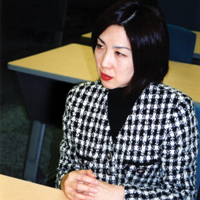 JI: Japan is famous for being the land of lifetime employment, so we assume that many people are probably changing jobs for the first time in their lives. If this is so, then is it true to say that most of your candidates are unequipped to deal with looking for a new job?
JI: Japan is famous for being the land of lifetime employment, so we assume that many people are probably changing jobs for the first time in their lives. If this is so, then is it true to say that most of your candidates are unequipped to deal with looking for a new job?
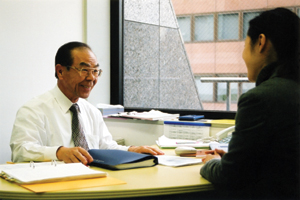 We have 45 staff members who are qualified industrial counselors. Our counselors come from varying fields of expertise such as IT, finance, electronics, chemical, pharmaceutical, the service and retail industries, et cetera. It is very important to have personal business experience for career transition counseling.
We have 45 staff members who are qualified industrial counselors. Our counselors come from varying fields of expertise such as IT, finance, electronics, chemical, pharmaceutical, the service and retail industries, et cetera. It is very important to have personal business experience for career transition counseling.
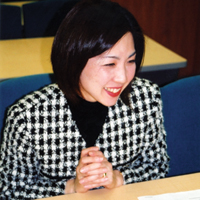 "A major part of our job is to help each
"A major part of our job is to help each JI: Do you do personality tests and capability assessments?
JI: Do you do personality tests and capability assessments?
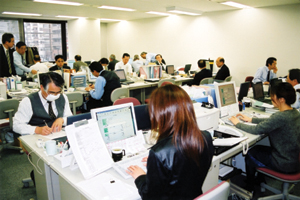 JI: Are the counselors involved in the job search process?
JI: Are the counselors involved in the job search process?



